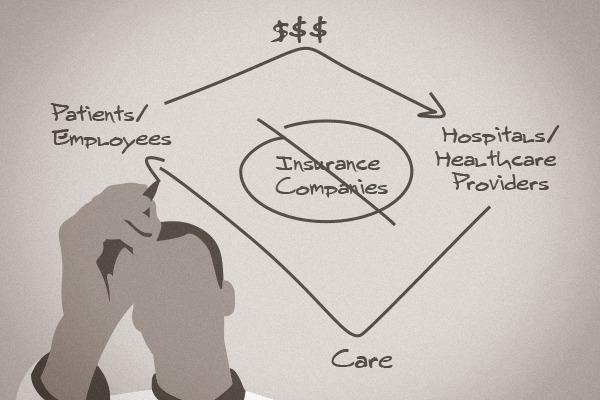 Dave Chase published an excellent post recently on Forbes.com, claiming that DPC is the Rorschach test for insurance providers. He insisted that in the interest of business, insurance providers should provide wrap-around plans, and encourage people to enter into the insurance-free market, because it would save time and money collectively. Now he’s written a follow-up post that goes into more detail about current DPC perspectives. Give this post your full attention as it provides a 360°-view of DPC in context with low-income people utilizing Medicare and Medicaid, unions, self-insured employers, Cigna (the first major carrier to partner with DPC providers), and more.
Dave Chase published an excellent post recently on Forbes.com, claiming that DPC is the Rorschach test for insurance providers. He insisted that in the interest of business, insurance providers should provide wrap-around plans, and encourage people to enter into the insurance-free market, because it would save time and money collectively. Now he’s written a follow-up post that goes into more detail about current DPC perspectives. Give this post your full attention as it provides a 360°-view of DPC in context with low-income people utilizing Medicare and Medicaid, unions, self-insured employers, Cigna (the first major carrier to partner with DPC providers), and more.
Dave Chase Examines DPC Provider, Purchaser and Payer Perspective

Healthcare Startup Helps Hospitals Launch Their Own Health Insurance Plans
The Washington Post reported on a healthcare provider facing rising insurance premiums. Instead of passing on the price increase to their employees, who would begrudge the extra cost, MedStar Health decided to offer their own insurance plan that would cover employees at their hospitals and a small network of providers. This is revolutionary, as the article states, “All of a sudden, the health system did not just send out insurance claims — it also received them… Insurance plans and hospitals are typically at loggerheads. They squabble over claims that the hospitals submit and insurers sometimes deny.” Eric Wagner, a MedStar vice president, said, “[Health insurers] make their money by not paying for health care to be delivered. We make our money by delivering care. There’s always been a natural tension.” But now a start-up in Northern Virginia named Evolent Health promises to teach hospital networks like MedStar Health how to build a health insurance plan from the ground up.

Have You Found Direct Care Success? Tell Us More About It
So we came across yet another article documenting direct care success. It’s practically overwhelming hearing all this good news, especially considering that our grassroots movement is producing practically no published stories of outright failure. Granted, running a business is challenging. And it doesn’t always work out. But, in the case of Dr. Usher, a former Mayo Clinic primary care physician, he left the insurance trap and found plenty of upsides. Dr. Usher is satisfied because he can keep his prices and overhead low and spend more time with patients. “We don’t have to mill them through,” he says. He also believes a retainer-based model, rather than strictly direct pay, might possibly earn his practice a more steady stream of income.

Direct Care IS The Rare Bipartisan Idea
We came across an article called “The Rare Bipartisan Health Idea: Affordable Concierge Medicine” over on New Atlantic Ventures (navfund.com), a website promoting entrepreneurial endeavors. It makes sense that our Atlas MD style of direct care would be featured there, being as we believe healthcare can administered more effectively when coupled with free-market principles. To us it makes sense to run a business where WE are responsible for our profits and losses, WE interact with our customers directly, and WE succeed by giving them top-notch service. It so happens that in our case, doing our job well means we ensure healthy patients, something we take great pride in.

LISTEN: Atlas MD Launches Weekly Podcast
Dr. Josh and Dr. Doug have launched a weekly iTunes podcast where they’ll talk about their experience running a direct care practice, and offer advice to physicians looking to transition into the model. The Atlas MD podcast is hosted on iTunes, but you can also listen to the free episodes on your browser. New episodes will be released every week, covering the steady stream of questions that Dr. Josh is receiving. LISTEN TO ATLAS MD ON iTUNES
In the premiere episode, Drs. Josh and Doug explain why starting up a direct care practice is more viable than you would imagine. For one, having an EMR that’s capable of automating admin functions will reduce staffing needs. In Atlas MD’s case, they’ve worked days where it’s just three doctors in the office, with no hiccups. Granted, it won’t work forever, but It’s possible because the core job of the doctor becomes treating patients, instead of filling out paperwork, which we all agree is NOT the reason anyone goes to med school.
Feel free to email any questions to hello[at]atlas[dot]md. Atlas MD’s doctors are passionate about practicing direct care, and equally passionate about helping other doctors practice it, too. It’s highly likely the doctors will address your question in a future podcast.
Study Shows That Too Many EHR Notifications Causing Missed Test Results
 A new post from Dark Daily says that a study shows too many electronic alerts cause nearly 30% of primary care physicians to overlook essential clinical laboratory test results. This according to researchers, including Hardeep Singh (pictured left), M.D., MPH, who led the Michael E. DeBakey Veterans Affairs Medical Center research team. Unfortunately, it looks like EHR systems are plagued by ‘alert overload.’ Which is what we’d expect, though, in an industry producing lackluster products.
A new post from Dark Daily says that a study shows too many electronic alerts cause nearly 30% of primary care physicians to overlook essential clinical laboratory test results. This according to researchers, including Hardeep Singh (pictured left), M.D., MPH, who led the Michael E. DeBakey Veterans Affairs Medical Center research team. Unfortunately, it looks like EHR systems are plagued by ‘alert overload.’ Which is what we’d expect, though, in an industry producing lackluster products.
In total, 5,001 VA physicians were invited to participate in the study, and of the 2,590 primary care physicians (PCPs) who did, some 29.8% overlooked test results from an EHR alert system on at least one occasion. Singh and his researchers’ survey findings suggested three factors that could lead to missed results in EHRs:

The Atlantic Advocates Healthcare Accountability
Richard Gunderman wrote a phenomenal essay for The Atlantic earlier this month. In it he explains the importance of accountable health care, claiming “We can be our best only if we bear at least some of the costs of the choices we make.” It is accepted that healthcare costs have within the last few years become the single most common cause of personal bankruptcy in the U.S. Of course, the natural reaction is to think of the indebted patients as victims, and hospitals as greedy predators. It’s not like the patients tried to get sick to they could taken on expensive medical care. Meanwhile hospitals retrofitted with marbled lobbies and elaborate amenities are indicative of surplus wealth. So Gunderman begs the question, “Who could feel sympathy for a billion-dollar corporation?”
However, he also points out that if patients are to be forgiven of their debts, we might run out of hospitals to turn to. That’s because a hospital that liberally provides free care will soon find itself overrun with patients, while the other hospitals fail to generate revenues that exceed their costs, and go out of business (this is hypothetical, but still a valid point).

Can Doctors Meet Growing Patient Demand For Insurance-Free Medicine?
Dr. Doug and Dr. Josh have been spreading the gospel of direct care on Fox News, late night podcasts and CNN. But Concierge Medicine Today (CMT) has some data showing the downside in concierge medicine. They’re finding that the number of patients seeking concierge medical care exceeds the actual number of primary care and family practice doctors on the market.
“Despite what we hear in the media about the increase in concierge and private-pay physicians growing across America, there are simply not enough of these [concierge-style, direct care or membership medicine-style] physicians in the U.S. to meet the current demand,” says Michael Tetreault, Editor-In-Chief of Concierge Medicine Today “At the end of the day, the marketplace is still falling short.”

